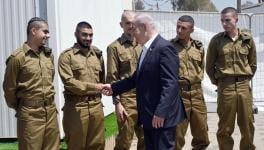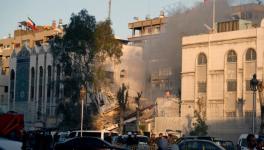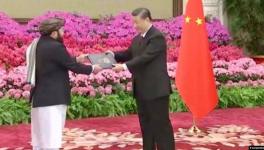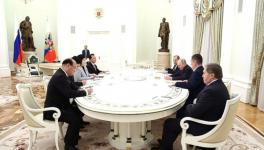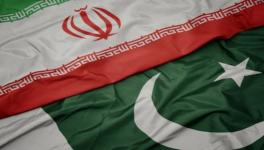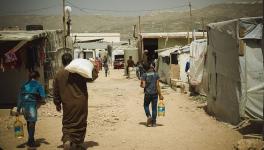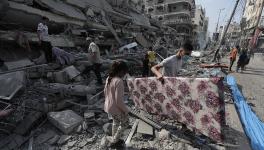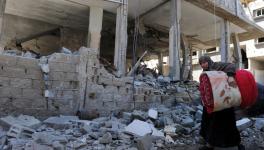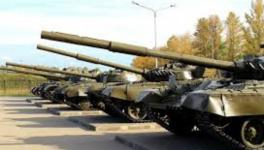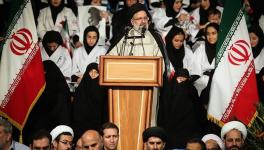Sultan Erdogan's War on the Kurds
West Asia is going through a new set of tectonic changes, the latest being Turkey's attack on the Kurds within Turkey and in northern Iraq. Senior Turkish officials are also talking about a “buffer zone” in North-eastern Syria. Is Turkey going to enter the war against Syrian government forces directly? Are they going to fight the Kurdish YPG, who control this area, and are aligned to the PKK in Turkey, therefore effectively align with IS? While they have allowed the US to use Incirlik airbase for bombing IS in Iraq, Turkey's primary target is clearly PKK and not IS; even though Turkey claims it has joined with the US in its fight against IS.
The US policy in the region is looking even more incoherent than earlier. While they need the Iranians to cooperate in Iraq to stabilise the government against the threat of IS, all their regional allies – Israel, Saudi Arabia, Turkey – are aligned either with IS or the al Qaeda affiliates in Syria and Yemen. To cap a bad weekend for the US, their “vetted” and “trained” Division 30, introduced recently in Syria, has been virtually liquidated. The bulk of their numbers, including their commander have been captured or killed by Jabahat al Nusra, the Syrian al Qaeda affiliate. Even though the Israeli and the Turkish regimes continue to support Jabahat al Nusra in Syria, it does not like the US stooges to play in their backyard. Al Nusra has also the added incentive of getting their hands on the shiny new toys that the US has given its new Division 30 recruits. The only surprise in this is that the US establishment should have been surprised at all by this turn of events.
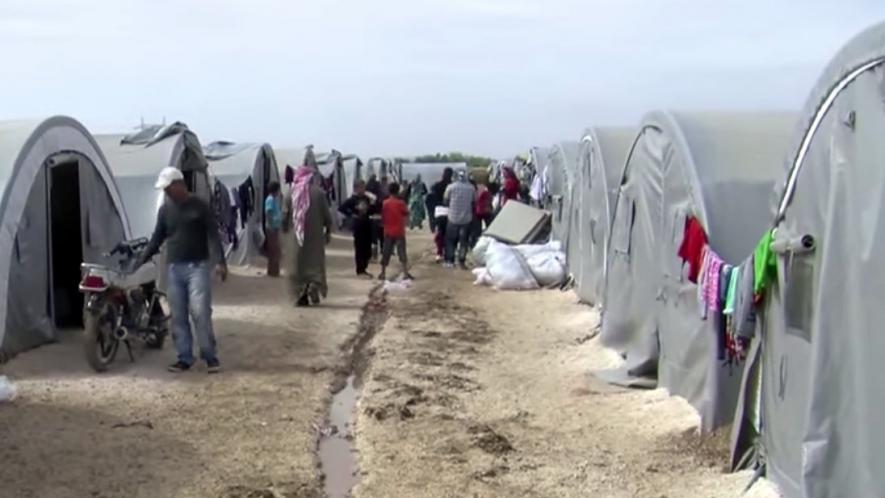
Image Courtesy:en.wikipedia.org
The US policy regarding Bashr al Assad is still murky. While they are now willing to grant that the Syrian Army and Hezbollah are the only forces capable of fighting the IS and the al Qaeda, they share Israel's view of the need to break the resistance axis of Iran, Hezbollah and Syria in the region and see Bashar al Assad as its weak link. The IS and al Qaeda, in this view, are not the primary targets, Bashar al Assad's government is. The sudden expansion of IS into Iraq and now Syria, might have changed this equation for the US, but at the moment their policies in the region -- not withstanding the Iran nuclear deal -- look even more confused.
Breaking the Kurdish Ceasefire
Turkey's actions last week broke the three-year old ceasefire that it had with the PKK, the Kurdish movement for autonomy. The peace accord had brought to a halt a 30-year old civil war fought by the six and a half million Kurds in Turkey, which has seen more than 40,000 killed. Though Turkey claims that it is now entering the fight against IS, it has lumped IS and PKK both as terrorists. The bulk of its airstrikes and arrests within Turkey, are directed at the PKK.
So why did Turkey break its three-year old peace to restart the war on the Kurds?
The immediate cause of renewed hostilities between the PKK and the Turkish government of Erdogan and the AKP (the Peace and Justice Party), was the bomb blast against Kurdish Socialist Youth Movement in Suruc, in which 32 activists were killed and more than 100 seriously injured. Suruc was the town from which the YPD forces fighting the IS in Kobane was supplied. The YPD, though on the Syrian side, is very much a part of the larger PKK movement. The Turkish Government denounced IS and the YPG, saying both were terrorists. For a long time, Turkey refused to let in aid and military support for the beleaguered YPD forces in Kobane. It was the heroic fight of the YPD and international pressure that finally forced a reluctant Erdogan to finally allow aid to the YPD.
The PKK believes – and there is evidence to support their belief – that the Turkish government is very much in alliance with the IS and al Qaeda forces. The IS is against the Syrian government of Bashar al Assad and has been fighting the Kurdish forces, not only in Syria but also in Iraq. The PKK therefore thinks that the Suruc killings were executed by the IS in connivance with the Turkish government. The PKK retaliated by attacking police posts and killing some policemen. This allowed Erdogan-led AKP government to unleash the Turkish airforce on PKK military camps in northern Iraq and a large scale crackdown on the PKK inside Turkey. The ceasefire between the Turkish government and PKK is effectively over, with both sides now preparing for renewed hostilities.
Turkey has an external and an internal context why it is breaking its ceasefire with the PKK. While Turkey has its larger strategic vision of defeating Bashar al Assad's government, and weakening Iran's influence in the region, what threatens it more, is the formation of a Kurdish independent region in northern Iraq and north-eastern Syria. PYD (the political party of which YPG is the military arm) forming a de-facto government in Rojava (north-eastern Syria and south of Turkey) and linking up with other Kurdish areas in Iraq, is seen as a threat to Turkey, as it provides strategic depth to PKK. Therefore the need to extend Turkish military control over this area, in the name of fighting IS.
The internal context is even more self-serving for the AKP and Erdogan. Erdogan had believed that in the last elections, the AKP would receive enough seats in the Parliament to change its constitution to a more direct Presidential form, than the Parliamentary form it has today. Unfortunately for him, the HDP, backed by the Kurdish minority and other left and secular forces in Turkey, broke through the 10% barrier required for Parliamentary representation and helped reduce AKP to a minority in the Parliament. Though AKP remained the largest party, it is now being forced into either a coalition government, or call for new elections in a couple of months.
Erdogan and AKP seem to be gambling on renewed civil war, so that it can move against the HDP for links to PKK and get it banned in the coming months. Under Turkey's electoral rules, if HDP is banned, it will lead to AKP, as the second largest party in the Kurdish areas, to get all the former HDP seats and emerge again as the dominant party in Parliament. AKP and Erdogan are therefore playing the high-stake game of renewed civil war, so that they can have a majority in the forthcoming elections. A civil war is then Erdogan's cynical ploy for a Parliamentary majority and changing Turkey into a new Sultanate under his autocratic rule.
While Erdogan seems clear in his goals inside and outside Turkey, the US does not appear to know who its allies and enemies are. It is in alliance with both Kurds and Turkey against IS, while Turkey considers Kurdish forces as its main enemy. Will the US forces fight against IS, along the Kurds, who are also fighting the IS? Or will the US help Turkey bomb Kurds? Has it sacrificed the Kurds in order to secure the use of the Ircilik air base? And to what purpose?
The Western Powers: Evil or Just Stupid
What will the US do, when Turkey decides – as its is threatening now – to extend a no-fly zone against the Syrian government, and provide a safe haven for the IS and other anti-Syrian forces? It's dream of having “moderate” forces which will fight both Bashar al Assad's government and the IS is in tatters with Jabahat al Nusra capturing its Division 30. Will the US side with the resistance axis of Iran-Syria-Hezbollah against the IS, or go with its allies Israel, Saudi Arabia and Turkey, all of whom see IS as strategic assets? Or will it continue, as it is doing right now, to play both sides against the middle?
The US, since 2012, has not only been aware of the possibility of IS-like force taking over parts of Iraq and Syria, but were complicit in it. The western powers either believe that a fragmented and warring West Asia is in their interests, or are monumentally stupid. The jury is out on that. Either way, the costs will have to be paid by the rest of the world, most of all by the people in this oil-rich, resource cursed, unfortunate region.
Disclaimer: The views expressed here are the author's personal views, and do not necessarily represent the views of Newsclick
Get the latest reports & analysis with people's perspective on Protests, movements & deep analytical videos, discussions of the current affairs in your Telegram app. Subscribe to NewsClick's Telegram channel & get Real-Time updates on stories, as they get published on our website.









